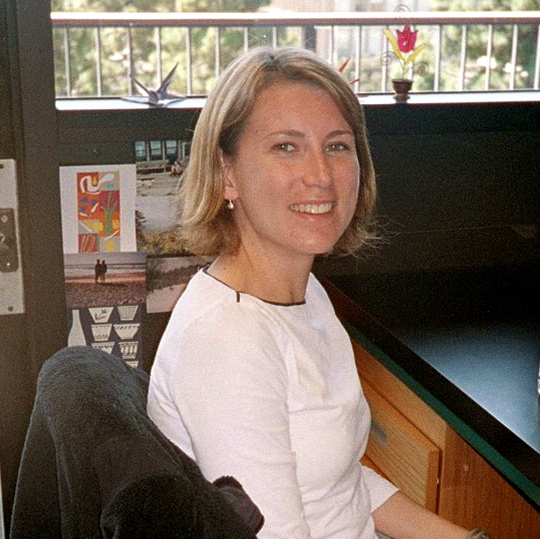Association of Hedgehog and Patched in Basal Cell Carcinoma
Keely Heidtman
Appointment Period: 2005-2006, Grant Year: [21]
 Mutations in the transmembrane receptor patched1 (ptc1) are responsible for the majority of basal cell carcinoma (BCC) cases. Many of these mutations, including ptc1-Q688X, result in premature truncation of the ptc1 protein. ptc1-Q688X has been identified in patients with both BCC and nevoid basal cell carcinoma syndrome, an inheritable disorder causing a predisposition to cancer susceptibility. Coexpression of wild-type ptc1 with a nuclear-targeted cyclin B1 derivative, mutated to mimic constitutive phosphorylation, dramatically decreases Gli1 activity. In addition, the coexpression of this constitutively nuclear cyclin B1 derivative with ptc1-Q688X substantially enhances foci formation. These studies therefore described a molecular mechanism for the aberrant activity of ptc1-Q688X that includes the premature activation of the transcription factor Gli1. In addition, my work also identified a point mutation that induces a novel calpain cleavage of the patched gene. This novel cleavage could potentially induce a deregulation of the pathway. The elucidation of the association of Patched and the Hedgehog pathway with these transcription factors may be important in determining treatments for these diseases.
Mutations in the transmembrane receptor patched1 (ptc1) are responsible for the majority of basal cell carcinoma (BCC) cases. Many of these mutations, including ptc1-Q688X, result in premature truncation of the ptc1 protein. ptc1-Q688X has been identified in patients with both BCC and nevoid basal cell carcinoma syndrome, an inheritable disorder causing a predisposition to cancer susceptibility. Coexpression of wild-type ptc1 with a nuclear-targeted cyclin B1 derivative, mutated to mimic constitutive phosphorylation, dramatically decreases Gli1 activity. In addition, the coexpression of this constitutively nuclear cyclin B1 derivative with ptc1-Q688X substantially enhances foci formation. These studies therefore described a molecular mechanism for the aberrant activity of ptc1-Q688X that includes the premature activation of the transcription factor Gli1. In addition, my work also identified a point mutation that induces a novel calpain cleavage of the patched gene. This novel cleavage could potentially induce a deregulation of the pathway. The elucidation of the association of Patched and the Hedgehog pathway with these transcription factors may be important in determining treatments for these diseases.
Barnes EA, Heidtman KJ, Donoghue DJ. Constitutive activation of the shh-ptc1 pathway by a patched1 mutation identified in BCC. Oncogene. (2005) 24:902-15. PMID: 15592520.
 Mutations in the transmembrane receptor patched1 (ptc1) are responsible for the majority of basal cell carcinoma (BCC) cases. Many of these mutations, including ptc1-Q688X, result in premature truncation of the ptc1 protein. ptc1-Q688X has been identified in patients with both BCC and nevoid basal cell carcinoma syndrome, an inheritable disorder causing a predisposition to cancer susceptibility. Coexpression of wild-type ptc1 with a nuclear-targeted cyclin B1 derivative, mutated to mimic constitutive phosphorylation, dramatically decreases Gli1 activity. In addition, the coexpression of this constitutively nuclear cyclin B1 derivative with ptc1-Q688X substantially enhances foci formation. These studies therefore described a molecular mechanism for the aberrant activity of ptc1-Q688X that includes the premature activation of the transcription factor Gli1. In addition, my work also identified a point mutation that induces a novel calpain cleavage of the patched gene. This novel cleavage could potentially induce a deregulation of the pathway. The elucidation of the association of Patched and the Hedgehog pathway with these transcription factors may be important in determining treatments for these diseases.
Mutations in the transmembrane receptor patched1 (ptc1) are responsible for the majority of basal cell carcinoma (BCC) cases. Many of these mutations, including ptc1-Q688X, result in premature truncation of the ptc1 protein. ptc1-Q688X has been identified in patients with both BCC and nevoid basal cell carcinoma syndrome, an inheritable disorder causing a predisposition to cancer susceptibility. Coexpression of wild-type ptc1 with a nuclear-targeted cyclin B1 derivative, mutated to mimic constitutive phosphorylation, dramatically decreases Gli1 activity. In addition, the coexpression of this constitutively nuclear cyclin B1 derivative with ptc1-Q688X substantially enhances foci formation. These studies therefore described a molecular mechanism for the aberrant activity of ptc1-Q688X that includes the premature activation of the transcription factor Gli1. In addition, my work also identified a point mutation that induces a novel calpain cleavage of the patched gene. This novel cleavage could potentially induce a deregulation of the pathway. The elucidation of the association of Patched and the Hedgehog pathway with these transcription factors may be important in determining treatments for these diseases.